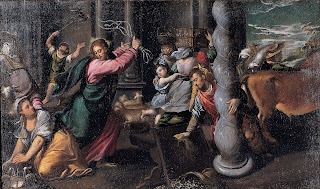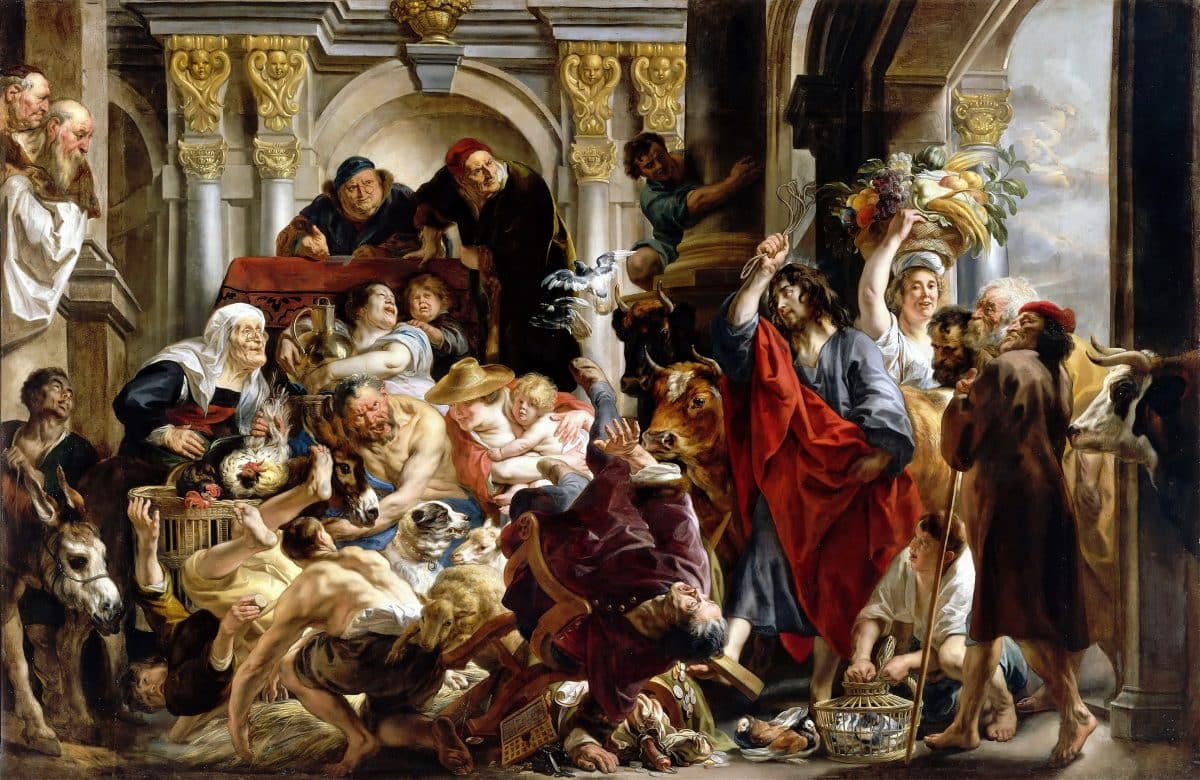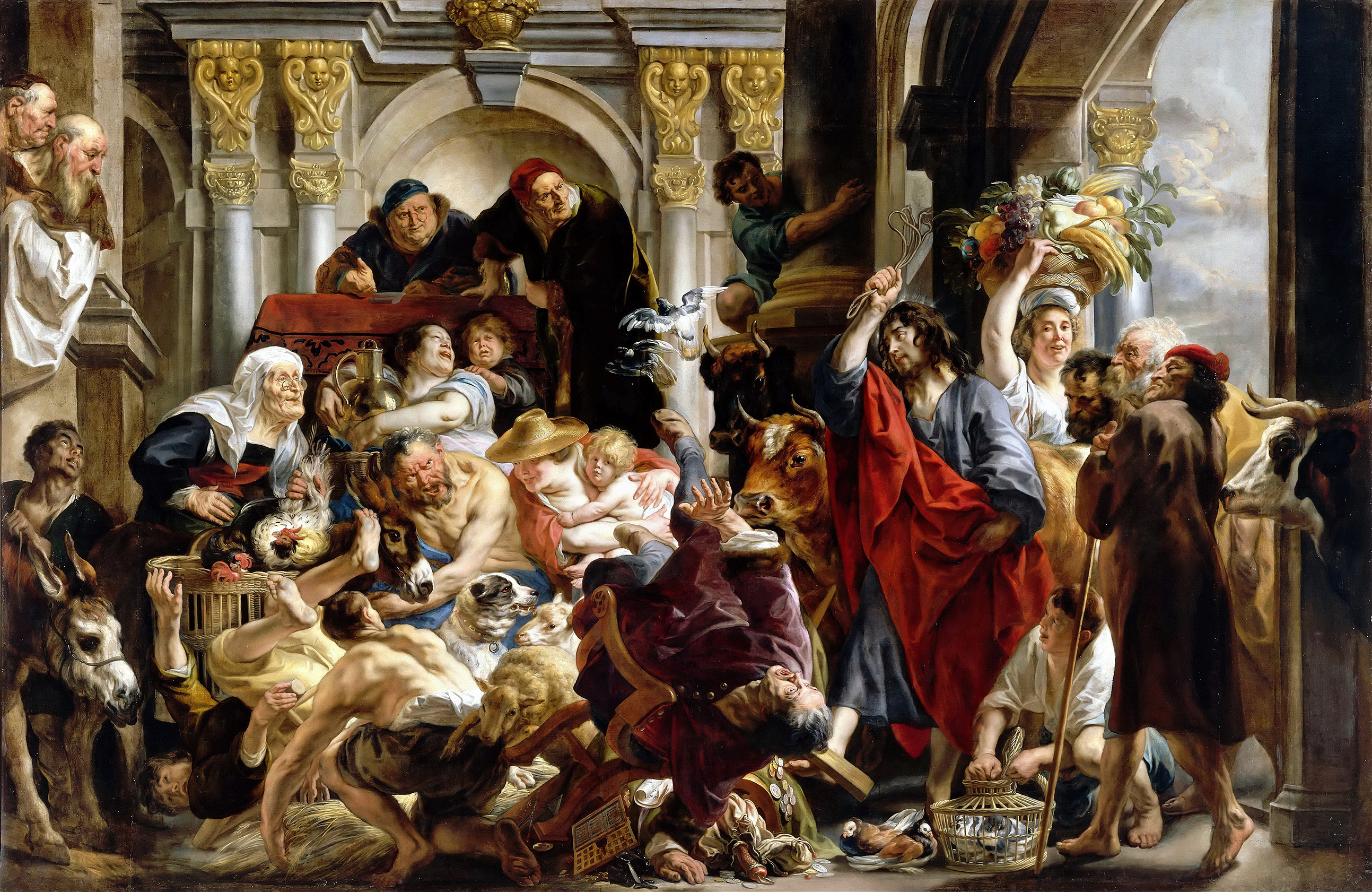(Third Sunday of Lent-Year B; This homily was given on March 2 & 3, 2024 at Saint Augustine Church in Providence, Rhode Island; See Exodus 20:1-17 and John 2:13-25)



Church Militant, the far-right Catholic media network, will cease operating at the end of April, according to a press release issued March 1 by the law firm Todd & Weld LLP.
The law firm announced that Church Militant, operated by St. Michael’s Media, had lost a defamation lawsuit to the Rev. Georges de Laire, a canon lawyer and priest in the Diocese of Manchester, New Hampshire. Church Militant agreed to pay $500,000 and apologize to de Laire, said the law firm, which represented de Laire.
On Jan. 17, 2019, Church Militant published an anonymously written story titled, « NH Vicar Changes Dogma Into Heresy, » about de Laire. After de Laire sued the outlet for defamation, the author of the article was revealed to be Marc Balestrieri, a canon lawyer who was representing a client in a dispute where de Laire was representing the diocese of Manchester.
In that dispute, the Diocese of Manchester had accused the Saint Benedict Center in Richmond, New Hampshire, of violating canon law, according to Todd & Weld. The Saint Benedict Center and its members, who call themselves, Slaves of the Immaculate Heart of Mary, had promoted the position held by their founder, a Jesuit priest named Leonard Feeney, that salvation is only possible through the Catholic Church.
Feeney, who died in 1978, was excommunicated for this view, though he was later reconciled to the church.
The Southern Poverty Law Center also added the center to a list of hate groups in 2007 for its members’ antisemitic beliefs.
In 2019, the Diocese of Manchester forbade Catholics from participating in activities with the center and the center from calling itself Catholic because they said that they had warned the group that their position is contrary to Vatican teaching.
The law firm alleges that Balestrieri used his article to « discredit Father de Laire and the Diocese and to raise funds, » some of which would go to pay for Balestrieri’s legal work.
After he was sued for defamation, Balestrieri did not appear to defend himself nor did he appear for a deposition, according to both Church Militant and Todd & Weld.
For his article, Balestrieri claimed to have talked with anonymous sources who allegedly made negative personal and professional comments about de Laire, but Church Militant and Balestrieri never identified any sources who said anything negative about de Laire.
« SMM and Church Militant regret that the article was not properly vetted, » the outlet’s apology says, using an acronym for St. Michael’s Media.
« SMM sincerely apologizes for their part in any distress or damage they may have caused Father de Laire, » they wrote.
On Feb. 24, The Washington Post reported that Church Militant leader Michael Voris’ resignation in November came after his habit of sending shirtless photos of himself to staff and a donor led to those photos appearing on the outlet’s cloud-storage account.
Voris had previously publicly repented for his relationships with men, even as he led prominent anti-LGBTQ+ campaigns and mudslinging.
While Church Militant reported $79,248 in net assets in their tax filing for the fiscal year ending in December of 2022, St. Michaels Media disclosed $2,699,449 in net assets for the same period.
Also on March 1, the city of Baltimore agreed to pay Church Militant $275,000 in a settlement in Church Militant’s lawsuit over the city’s attempts to cancel a 2021 rally outside the U.S. bishops conference.
The city said they attempted to block the rally because « of a legitimate fear that it would incite violence » because far-right provocateurs Steve Bannon and Milo Yiannopoulos were planned speakers and the event might draw counter-protesters.
While Baltimore « vehemently objects to the group’s message of hate, given the court’s initial decision, the city feels the best course of action is to settle this matter now to mitigate further exposure were the matter to proceed to trial, » the Baltimore City Law Department wrote in a Feb. 29 statement.


When you ask someone what their religion is, the chance that they will say « none » has increased dramatically in the past few decades. Religiosity used to be a defining characteristic of U.S. culture. Protestants were known for the word and avoiding statues; Catholics attended Sunday Mass and abstained from meat on Fridays; Jewish people were notable for their faithful observance of the Sabbath.
Today, Exodus recounts God’s self-description: « I am the Lord who brought you out of Egypt. » This tells us that Israel’s God gets involved in human history by calling on people like Moses to carry out divine plans. Then we hear God’s commandments, which were not really very extraordinary; most mirrored the ethics of civilizations of their time: No society condoned lying, stealing or abandoning the elderly.
But Israel’s Sabbath was unique. Imitating their God, Israelites consecrated one of every seven days for worship, family celebrations and leisure. The Sabbath affirmed that people are more important than work, that strong relationships with God and others outvalue any accomplishment and that everyone needs time for re-creation, for recentering themselves in relation to everything else.
Sabbath became an approach to life sacramentalizing the people’s time and leisure. The Sabbath enhanced the people’s relationship with God and also intensified their shared identity. The attitude of Sabbath honed Israel’s appreciation of the sacredness that surrounded them and highlighted places and practices that sharpened their awareness of the presence of God and the meaning of their life.
While the God of Israel could appear anywhere, the temple functioned as a focal point for prayer and other expressions of the peoples’ relationship with God. It was a holy place. The day Jesus entered the temple he observed not faith, but sacrilege. This place of worship, the religious center for all God’s people, looked like a bazaar — one in which distinctions between male and female, clergy and laity, wealthy and poor were on display and reinforced.
Rather than being an inducement to prayer, sacrifice had become a business, supporting the money changers and merchants who made fortunes by selling supposed access to God. Operating as the opposite of what it was intended to be, the temple could impede people’s experience of a merciful, loving God. In Jesus’ eyes, the temple had become a blasphemy, the anti-reign of God.
After evicting the religious retailers, Jesus made the famous statement, « Destroy this temple and in three days, I will raise it up again. » John explains that « this temple » referred to Jesus himself, not an architectural wonder.
As in his conversation with a woman at a well, that phrase taught that God’s presence cannot be captured in structures — be they buildings, tabernacles or even particular practices. We discover God’s presence like Moses did. He experienced a mystery that called him to an impossible vocation, a vocation that came to fruition through the help of the Holy Spirit.
Jesus claimed that he definitively replaced the temple and sacrifice. He sacramentalized the presence of God through his loving relationships and all that flowed from them.
When we say that God is love, we assert that God’s presence is mediated in relationships. Institutions may facilitate our awareness of God’s presence, but we encounter God in prayer and in the love among us that makes God’s own love palpable in our world.
When we say that we are Christians, we claim with St. Paul that we believe that God’s greatest self-revelation came to us in Christ whose cross revealed that the foolish vulnerability of divine love expresses the greatest power in creation. The power of divine love is neither controlling nor coercive. God’s love attracts and woos us.
Jesus’ vehemence in the temple sprang from the fact that people had distorted their faith and desecrated God’s house. They offered a counterfeit relationship with God based on sacrifice over love. If the desecrators of the temple had been asked what their religion was, one honest answer would have been « profit, » and another would have been « power. » The most cynical and honest might have said, « none. »
Contemplating Jesus’ fury in the temple calls us to take account of ourselves. What religion do we proclaim in our worship and our daily actions? Do we take advantage of holy times for re-creation that can permeate our week or have our Sabbaths slipped away, taking second (or third) place to work, profit, sports or any other activity that distracts us from taking the time to create ever-deeper relationships with God and neighbor?
This third week of Lent calls us to reevaluate our religious identity. If we ask not what we call our denomination, but what our behavior reveals about our real beliefs, what’s the honest answer? How do we want to answer?


Following are NCR reader responses to recent news articles, opinion columns and theological essays with letters that have been edited for length and clarity.
Open every door
Years ago a documentary on species extinction was accompanied by lyrics which have haunted me in many ways: « Will you still be there when we learn to care. » The crises which face the church and the world may make the full peership of women seem of low priority (ncronline.org, Feb. 26, 2024). Look at it this way though, solutions necessitate all necessary elements in place and in proper proportion. Preconditions matter.
Even the stereotype of women created by the church to exclude and diminish paradoxically cry out to demand the fullness of women in peership. It is not merely about ordination to the priesthood, yet it is. Only through ordination women as persons can be the ‘persona’ of the feminine in creation, in the church and in the world become efficacious. Pious rhetoric, ‘left-handed’ adulation and poetry as theology by men cannot substitute for person in place(s).
If we believe that the church will endure; if we believe that the world needs Christ, then we must ‘care’ enough to open every door, avenue, nook that humans occupy to women.
DENNIS MACDONALD
Bedford, Nova Scotia
***
A social justice issue
As a Gannon University alumnus, I have never been so disappointed in their lack of ethics and social responsibility (ncronline.org, Feb. 19, 2024). Gannon expresses pride in being a part of Pope Francis’ first cohort of Laudata Si’ universities which calls for sustainability in the spirit of integral ecology. They claim to be building a better future together with « profound care of each other, our Creator and all creation » through their Project NePTWNE.
The Blasco Library is the only library in the City of Erie, home to a large low-income population. With no public meetings before engaging in this bargain-basement, long-term lease, Gannon is taking space from the Erie public and taxpayers along with the Blasco Library program staff who offer programs and opportunities for personal, educational and economic development. The Gannon lease includes space where the library provides access to free equipment (computers, WiFi, printers), meeting rooms and staff offices. The equipment is used to find and apply for jobs, housing and benefits, renew prescriptions and take classes. The meeting rooms provide space for online job interviews, meetings with counselors to get help to find housing, mental health care and educational support.
This is a social justice issue. Gannon, who is well-endowed financially, has lost their way and the Catholic values I learned as a student. With this lease, Gannon is stealing from the citizens of Erie.
MARCYANN BENCIVENGA
McKean, Pennsylvania
***
Public space
Gannon University’s disregard for the people of Erie — many of whom have voiced valid concerns with the shady, underhanded and secretive process that led to the leasing of space within the public library — shows how degraded the institution is (ncronline.org, Feb. 19, 2024). How can an institution claim to educate an informed citizenry when the institution itself chooses to thumb its nose at the prospect of allowing the public a say in the placement of a project in a public space from the very start? Gannon chose to collude with the county executive in a months-long effort to keep the citizenry in the dark while they brokered a back door deal to give away public space in the public library for pennies on the dollar.
MARCIA K. FARRELL
Erie, Pennsylvania
***
It’s no wonder
The reactions of many anti-Francis prelates to the opening and welcome of our church is telling (ncronline.org, Feb. 21, 2024). They seem to prefer the old days of exclusivity as opposed to reaching out to all. The nature of the blessing is, from all accounts, independent of the marital relationship of the couple. The state decides who is legally married. The church decides who is married sacramentally and the state could not care about the latter distinction. If the church refuses to marry two people of the same sex in much the same way in the past it refused to marry people of different races, that is not of concern to the state. But treating our faithful brothers and sisters as second class has no place in the Catholic Church of today.
The church blesses buildings and pets. Why can’t Bishop Cary see that two people, as individuals, are much more important than animals and objects? The individuals would feel welcome and a part of their church. If the church wants to retain exclusivity it should not wonder why the pews fail to fill.
CHARLES A. LEGUERN
Granger, Indiana
***
Learn from the past
While all the bickering goes on about the synod, Murphy’s article offers a view that is « restorative » rather than one of « synodality » (NCR, Feb. 2–15, 2024). This covers a wider scope of Catholics. The Synod is truth-telling and can therefore be a recognition of past harmful practices that were accepted by the church, but no longer. For example, it was once acceptable for Catholics to own slaves. We need an ongoing process that will address the past as well as problems today. We cannot change the past, but we can learn from it.
CONSTANCE WILDER-WOKOUN
Hamilton Square, New Jersey